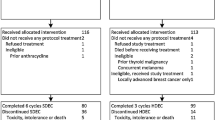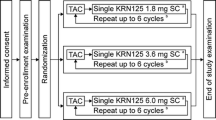Summary
The results of systemic treatment for primary and metastatic breast cancer have plateaued in the past decade. The majority of oncologists continue to use the same chemotherapy regimens and endocrine therapies that were available in the mid 1970s. In metastatic breast cancer, still only 60–70% of patients can be expected to achieve a remission, with only 10–20% of these being a complete remission, which is usually of short duration. Metastatic breast cancer remains incurable today. Obviously, new treatment strategies are needed. The development of new active drugs, or the development of innovative ways of giving old drugs, has been disappointing in breast cancer. Similarly, combining hormones with chemotherapy, or the use of various biologic response modifiers, has not resulted in a major advance. One strategy that is currently undergoing active research is increased dose intensity of chemotherapy. This can be achieved by delivering extremely high doses of cytotoxic chemotherapy followed by hematopoietic support. A second approach involves delivering lower doses, but on a more frequent schedule than conventional programs. Preliminary results from phase II evaluation of these programs demonstrate high complete response rates, relatively short response durations, and considerable toxicity. However, 10–20% of patients treated with these regimens remain in complete remission several years after treatment, providing optimism that this approach may be effective in some patients. Advances in hematopoietic support, including autologous bone marrow transplantation (ABMT), peripheral stem cell administration, and the use of hematopoietic growth factors, have reduced toxicity. This strategy is now ready for phase III randomized trials in metastatic breast cancer as well as in the high-risk adjuvant patient to determine if high-dose therapy offers a worthwhile advantage in patients with breast cancer.
Similar content being viewed by others
References
Henderson IC, Hayes DF, Gelman R: Dose-response in the treatment of breast cancer: a critical review. J Clin Oncol 6: 1501–1515, 1988
Peters WP, Shpall EJ, Jones RB, Olsen GA, Bast RC, Gockerman JP, Moore JO: High-dose combination alkylating agents with bone marrow support as initial treatment for metastatic breast cancer. J Clin Oncol 6: 1368–1376, 1988
Jones RB, Shpall EJ, Ross M, Bast R, Affronti M, Peters WP: AFM induction chemotherapy, followed by intensive alkylating agent consolidation with autologous bone marrow support for advanced breast cancer: current results. Proc ASCO 9: 9, 1990 (Abstract)
Antman K, Eder J, Elias A, Ayash L, Wheeler C, Schnipper L, Frei E III: High dose cyclophosphamide, thiotepa and carboplatin intensification with autologous bone marrow support in patients with breast cancer responding to standard dose induction therapy. Proc ASCO 9: 10, 1990 (Abstract)
Dunphy F, Spitzer G, Buzdar A, Hortobagyi G, Horwitz L, Yau J, Spinolo J, Jagannath S, Dicke K: High-dose therapy with ABMT in metastatic breast cancer: clinical features of prolonged progression-free survival. Proc ASCO 8: 25, 1989 (Abstract)
Hryniuk WM: Average relative dose intensity and the impact on design of clinical trials. Semin Oncol 14: 65–74, 1987
Hryniuk W, Bush H: The importance of dose intensity in chemotherapy of metastatic breast cancer. J Clin Oncol 2: 1281–1288, 1984
Tannock IF, Boyd NR, DeBoer G, Erlichman C, Fine S, Larocque G, Mayers C, Perrault D, Sutherland H: A randomized trial of two dose levels of cyclophosphamide, methotrexate, and fluorouracil chemotherapy for patients with metastatic breast cancer. J Clin Oncol 6: 1377–1387, 1988
Hortobagyi GN, Buzdar AU, Bodey GP, Kau S, Rodriguez V, Legha SS, Yap H-Y, Blumenschein GR: High-dose induction chemotherapy of metastatic breast cancer in protected environment: a prospective randomized study. J Clin Oncol 5: 178–184, 1987
Author information
Authors and Affiliations
Rights and permissions
About this article
Cite this article
Osborne, C.K. Dose intensity as a therapeutic strategy in breast cancer. Breast Cancer Res Tr 20 (Suppl 1), S11–S14 (1991). https://doi.org/10.1007/BF01908239
Issue Date:
DOI: https://doi.org/10.1007/BF01908239




